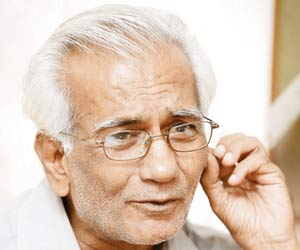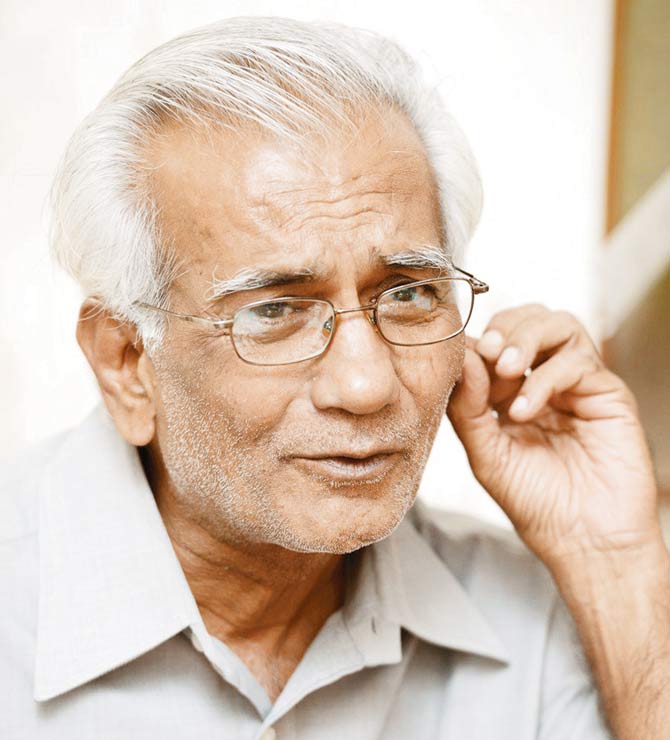We'll never know if there was more to Kundan Shah than his singular cult film that's been playing non-stop for over three decades

 It was a rather curious moment, have to say. I'd stepped out for a smoke during the interval of a terribly loud, trashy comedy, produced by a major corporation, evidently inspired by the Mahabharat scene in Kundan Shah's Jaane Bhi Do Yaaro (JBDY, 1983). And the man shaking his head in absolute disgust, standing right next to me, was Shah. "You know the cash-for-votes scandal that just happened," he asked me. The said 2008 scam, involving cash being physically produced inside the Indian Parliament, as proof that MPs' votes had indeed been bought out, was the news of the day. "The guys who funded that scam, I tell you, are the same ones who've produced this movie," Shah said, shaking his head still, elaborating on a long conspiracy theory he had on how India and the world's top income percentile saw merit in screwing society over.
It was a rather curious moment, have to say. I'd stepped out for a smoke during the interval of a terribly loud, trashy comedy, produced by a major corporation, evidently inspired by the Mahabharat scene in Kundan Shah's Jaane Bhi Do Yaaro (JBDY, 1983). And the man shaking his head in absolute disgust, standing right next to me, was Shah. "You know the cash-for-votes scandal that just happened," he asked me. The said 2008 scam, involving cash being physically produced inside the Indian Parliament, as proof that MPs' votes had indeed been bought out, was the news of the day. "The guys who funded that scam, I tell you, are the same ones who've produced this movie," Shah said, shaking his head still, elaborating on a long conspiracy theory he had on how India and the world's top income percentile saw merit in screwing society over.

Kundan Shah passed away on October 7 after he suffered a heart attack
ADVERTISEMENT
Shah's extreme cynicism, bordering on paranoia, smelled of an idealism bestowed upon the young. By 60-plus, pretty much all of us reconcile to the fact that the world is what it is - there is no point furiously raging against it any more than wrestling a wild pig. We met several times on similar occasions, heading out to a corner for a smoke, and he'd inevitably rant about the state of the world, and the news media in particular.
Being a reporter, I'm quite used to this, especially while hanging out with showbiz folk. Which is gently ironic, given that some of the same guys who complain about severe decline in Indian journalism rarely have issues with paying for advertisements to be passed off as editorial content themselves. But Shah's cynicism was more along the lines of a defeated common man's - rather than a highfalutin artiste's. This reflected in his demeanour - sartorial, and otherwise. Which is what shocked me first when he called out to me once - a scrawny old man, standing in a gully, unshaven, in his bush-shirt, faux leather chappals, holding a green 'thaila' (polythene bag) of vegetables - walking back to his Shirley Rajan apartment in Bandra.
He could easily be mistaken for a lower-middle-class 'society secretary', which by the way he used to be, while he was writing JBDY - the whole 'gutter' track in the film arose from him learning secrets of the quality of water supply in his own building. "Oh my god, that's Kundan Shah," I automatically exulted in my head, looking back at him.
To give millennials a perspective, Shah Rukh Khan once told me in an interview that the only thing his Delhi theatre friends ever wanted him to do, as he was moving to Mumbai to work in movies, was to touch Kundan Shah's feet on their behalf! Khan of course did much more than that. He starred in Shah's first film a whole decade after JBDY - Kabhi Haan Kabhi Naa (1993) - a piece exuding such innate charm and innocence that superstar Khan himself would find impossible to replicate in his superstar-career thereafter. The same was true for Shah, by the way.
Was Shah the only artiste who couldn't quite live down the curse of his initial masterpiece? The late actor Ravi Baswani, who played the photo-journalist Sudhir Mishra in the tragicomedy, was another. Baswani once told me that he wished he'd died after JBDY (and Sai Paranjpe's Chashme Buddoor, 1981). He would've become the "James Dean of India." I sort of agreed. It's hard to find roles so endearingly iconic, yet timelessly real.
You only have to watch some of Shah's TV shows - Yeh Jo Hai Zindagi, Circus, Nukkad, Wagle Ki Duniya - to sense how uniquely gifted he was at developing common-man characters. He had a closet full of film scripts he had written with no takers whatsoever. Perhaps no one could easily tell how those films would pan out commercially.
To be fair, producer Gul Anand, who at one point used to heavily back middle-of-the-road cinema in the '80s, told Shah that he was open to picking up JBDY for commercial release, now that it was already made (it was produced by the state-run NFDC). But if the director had come to him with the same script, he wouldn't have touched it with a barge pole. Actor-director Aparna Sen (approached for the newspaper editor's part) had slept off while being narrated JBDY's script.
Consciously, I never brought up JBDY with Shah, whenever we met. Not because I'm any less of a fan. But there was really far more to the man than being a filmmaker - let alone of the cult classic. But, of course, in an hour-long interview I did with him on 30 years of JBDY at the ComicCon in Mumbai, I had to bring this up - without coming across as rude.
I told him Joseph Heller was once asked why he couldn't write a book that came close to Catch 22. "No one else could either," Heller had said. What was his response over JBDY? Shah quoted Jiddu Krishnamurthy: "Well, it's no sign of health to be well-adjusted to a sick society either."
Mayank Shekhar attempts to make sense of mass culture. He tweets @mayankw14. Send your feedback to mailbag@mid-day.com
 Subscribe today by clicking the link and stay updated with the latest news!" Click here!
Subscribe today by clicking the link and stay updated with the latest news!" Click here!







